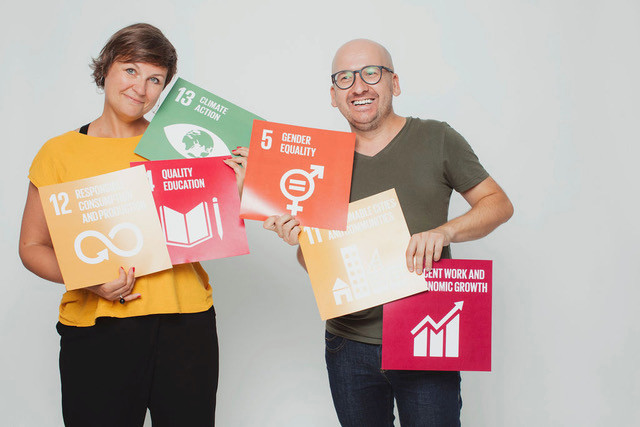Abigail Okorodus: What do you consider the most rewarding part of running a social enterprise?
Magdalena Jakubowska: [A] sense of belonging to the community of change makers who can influence the rules of the game: we believe that we have a significant impact on creativity and the imagination of people in Luxembourg as well as the “futures literacy" competence that is essential for development of sustainability. Often, social entrepreneurship is smart. It reduces waste, helps resources to circulate, smartly connects various actors along a supply chain… We definitely feel that we are part of the new economy.
Why did Art Square Lab make the switch to become an SIS?
As experts in design thinking, we are aware that this innovative methodology can successfully transform private companies but also organisations in the public sector. We see a huge potential of this human-centred methodology in transforming education. This is why since the beginning, we’ve been dedicating time and resources to stay connected with the youth sector: youth workers and educators in Luxembourg. We offer them design thinking trainings focused on creative problem solving and generating ideas especially when it comes to solving environmental and societal issues using the power of creativity and expanding imagination.
Did the transition affect the nature and services your business offers? If yes, how? If no, why?
Our core business- consulting in design and re-design of services has always been focused on the human aspect--a user, a citizen, a participant, a customer. However following current developments, we’ve become more aware of planet-centricity--staying within social and environmental boundaries of the planet. [In the] last years, we have been strongly advocating for the sustainable mindset of our clients, so that their services can be sustainable/inclusive/circular-by-design, not by... accident. We also pay attention to share our knowledge with young generations and we take care of transferring the social entrepreneurship spirit to the students of, for example, Ecole de Commerce et de Gestion.
What key points should social entrepreneurs consider before striking out?
It is important to rethink the values and business approach: to what future scenario do they want to contribute? Is that a “we” approach or a “me” approach? How will their business develop in the scenario of abundance and in the scenario of scarcity? An important question to ask is what social or environmental impact they can contribute to and how that will be measured. In other words: what kind of ancestors we are for the future generations? We are aware that this kind of narrative is not usual for business but the questions become more and more topical also for non social entrepreneurs who need to get aligned with the SDGs, ESG and other frameworks.
You’ve been organising some Erasmus and youth-centred projects recently, is this your target audience?
Young people, young citizens are definitely our target of social impact, as much as we can we share our expertise with them and we count on them when it comes to the sustainable future(s). Erasmus Plus projects allow us to be part of international partnerships with various actors in business, public sector, higher education and bring new practices to Luxembourg. Thanks to the program, for several years we have developed common tools and built services with the University of Turku in Finland, University of Luxembourg as well social economy actors in France like Cap Solidaire in Gironde. We are also happy to represent Luxembourg in the European Consortia - we have a lot of good ideas to share.
What’s the biggest misconception you’ve heard or experienced as a social enterprise?
We hear far too often that social entrepreneurs should not earn money. Hmmm… we are a business like others, we “just” pay attention to the balance of monetary and social value of our activity. There is a fundamental difference between social impact enterprises and NGOs and charities, although we share the same goals. Another misconception is connected to the field of activities: social economy is not only about supporting “the poor”. The variety of business models, networking with regular economy players, learning from each other- creates a mature ecosystem with infinite number of human and planet-centric ideas. This is what we are building in Luxembourg.
This interview forms part of a 5-part SIS series.
